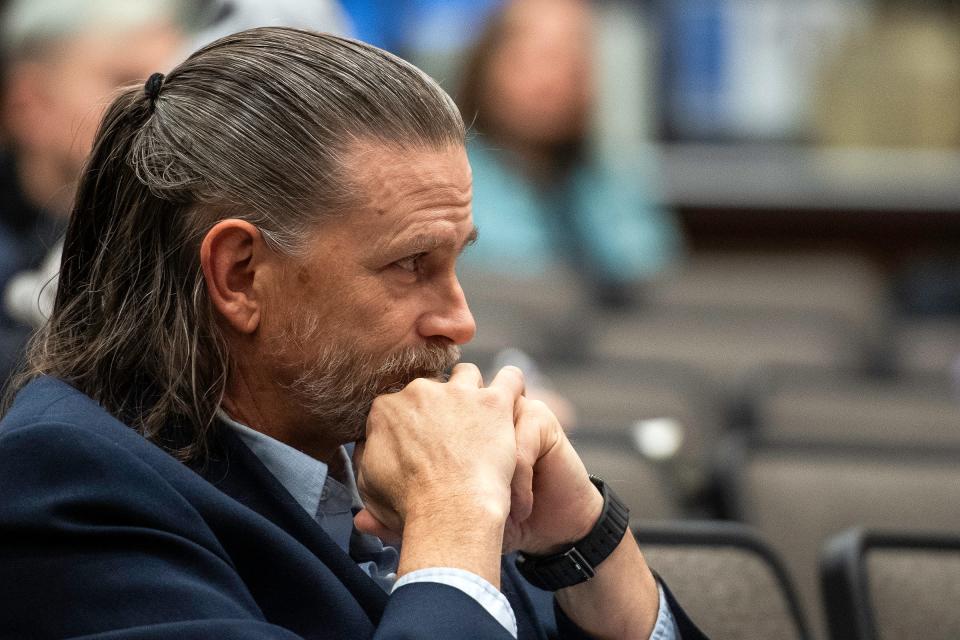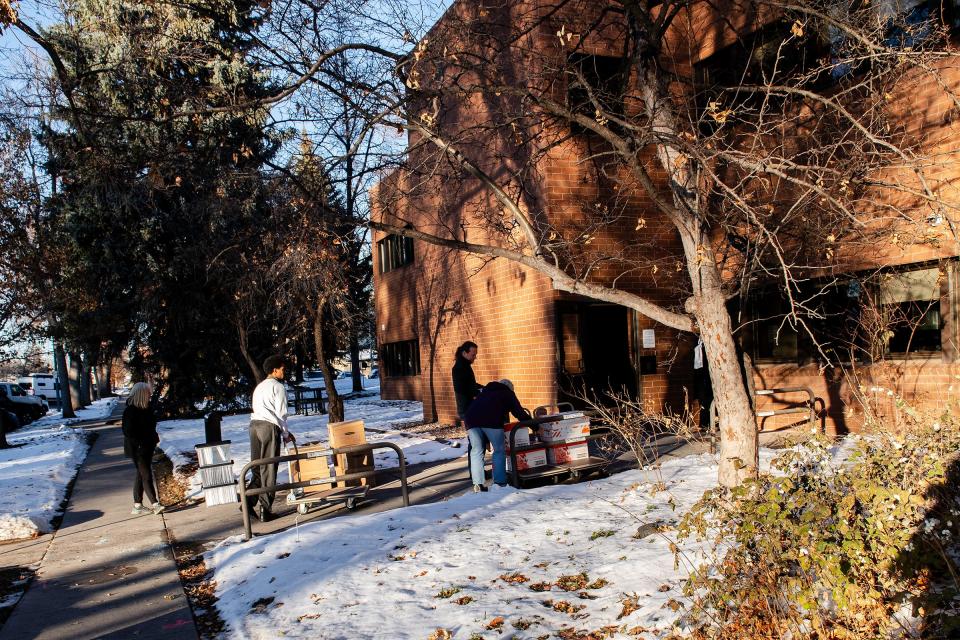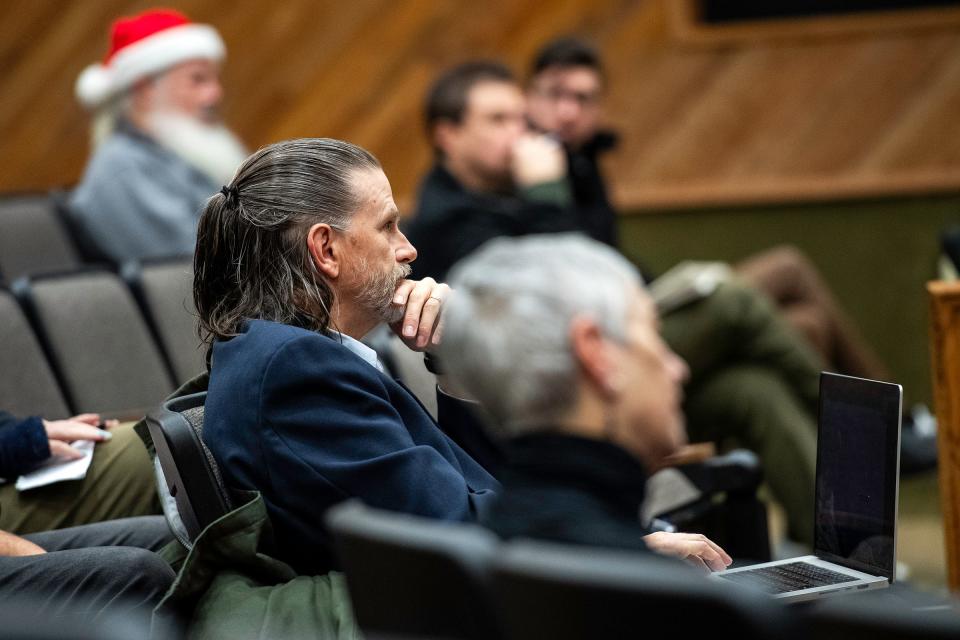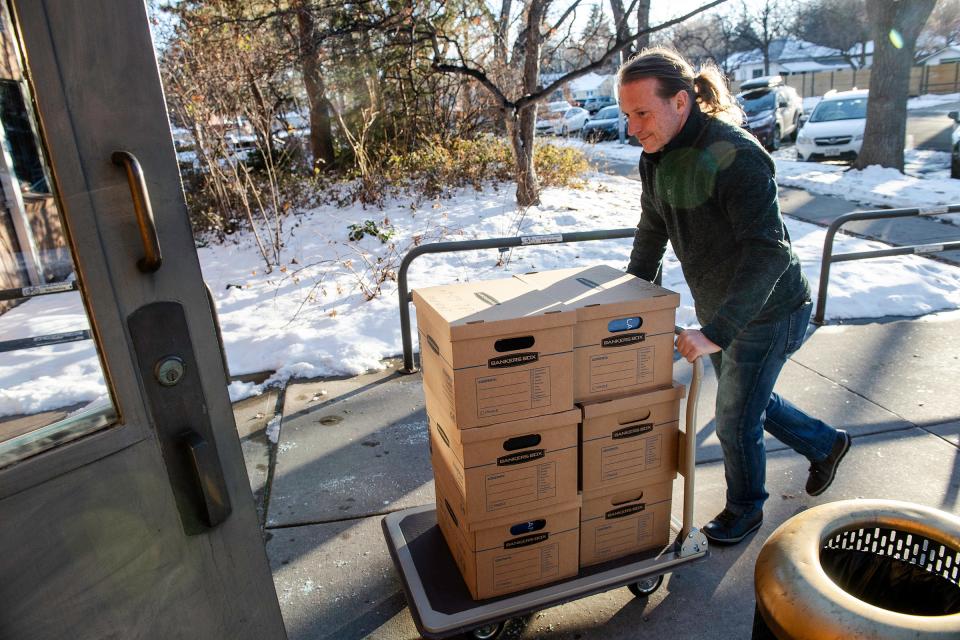Who is Preserve Fort Collins? Born out of land use code fight, group cites broader mission
Last October, you might have received some text messages that sounded an alarm:
"This is Lisa with Preserve Fort Collins. Petitions have arrived and it's time to sign!"
"This is Jen with Preserve Fort Collins. We have only a few days left to collect signatures to repeal the new Land Development Code."
"This is Mary, a volunteer with Preserve Fort Collins. ... These changes will create haphazard density and destroy the livability of our residential neighborhoods."
"Forced densification will greatly increase the cost of housing and living."
"The only winners are big developers, investors and land speculators."
By the time Preserve Fort Collins was mobilizing for the second time to repeal the land use code changes passed by City Council, its work had been going on for almost a year.
The land use code is the guiding document for how the city develops, setting rules for things like how much density is allowed and which building types and uses are allowed in different zones. It sets design standards, parking requirements, lot setbacks and more.
Some of the changes proposed, starting in 2022, were cause for concern for a group of well-informed residents, some of whom had served on City Council before.
And so began their fight.
The topic drew out hundreds of people from all perspectives to City Council meetings, where they gave impassioned testimony, sometimes angry and sometimes tearful.
Preserve's efforts led to two code repeals in the span of a year, but it also spurred a local counter-movement in YIMBY Fort Collins, which advocates for changing land use regulations in order to encourage more housing to be built.
Between the two repeals, the city's outreach was flawed, said Ross Cunniff, co-founder of Preserve Fort Collins.
"The consistent feedback that we were hearing and consistent with my experience is that these meetings were largely sales jobs for how wonderful the land use code changes were going to be and 'Don’t worry your pretty little heads,' you know, 'It's not going to destroy your neighborhood.' Basically, very condescending, patronizing."

At a May meeting, he said, staff didn’t take questions from participants.
"It wasn't even a feedback session; it was a sales job."
On April 16, council will consider a third version of a major land use code update, this time pared back to remove the most controversial items.
But it's far from settled in Fort Collins.
Some key aspects of the past code proposals could become state law this legislative session, and the city remains focused on finding ways to achieve more affordable and attainable housing.
And Preserve Fort Collins is still on alert.
Who is behind Preserve Fort Collins and how did it start?
Preserve Fort Collins formed about a year and a half ago, but many of its involved volunteers are longtime Fort Collins residents and former elected leaders.
In summer 2022, people were starting to hear about possible land use code updates coming through the Planning and Zoning commission, Cunniff said.
"The most concerning thing at that point was the elimination of the neighborhood meeting," he said, referring to a change that would have allowed residential developments to go forward without one. As a former City Council member for eight years, he said he worked to help elevate neighborhood residents' voices in decisions about developments and the proposed change bothered him and other former council members who had been gathering over coffee.
"It felt like that was cutting the neighborhood out," he said, and "when that was combined with the dramatic upzoning proposal in the first land development code, that was just kind of the final straw."
Also frustrating was when he emailed City Council, urging it to delay a final vote to get more community feedback, nobody answered.
"It felt like they knew what they wanted to do. They didn't seem to care what anybody else that wasn't in their inner circle thought," Cunniff said, and that's "not the way we should be doing things in Fort Collins."
Preserve Fort Collins registered as a nonprofit in November 2022, just two days after City Council passed sweeping changes to the land use code. Since then, the group has been successful in repealing two iterations of land use changes, first in December 2022 and again in November 2023.
In between the two repeals, PFC Action was registered as an issue committee with the city and as a nonprofit with the Colorado Secretary of State's Office in October 2023.
Cunniff is the registered agent for both Preserve Fort Collins and PFC Action.
He is the chairman of the seven-member board of directors, which makes decisions about whether to take up an initiative or spend money.
But he declined to name the other board members, citing targeted bullying he has experienced that called into question his character.
"The board members have seen that and don't want to subject themselves and their families to that," he said.
When the Coloradoan asked Cunniff if he could help assemble other Preserve Fort Collins leaders for an interview, he said they did not want to participate, citing a desire for their cause to be focused on the issues rather than on personalities.
2023 City Council candidates Eric Hamrick and Patricia Babbitt supported Preserve Fort Collins as petition signature gatherers.
Hamrick was listed as a petition representative on the 2022 repeal effort alongside Cunniff and former City Council member David Roy. Petition representatives listed on the 2023 repeal paperwork are Cunniff, Dawn Cramer and Melissa Abrams.
Cunniff said Preserve Fort Collins has a several-hundred volunteer organization.
"There's longtime community activists, former council members like myself," he said. "There are people that weren't ever involved with this before, younger people just starting out with their life in Fort Collins who came here because they liked Fort Collins and don't want it to change to something that it's not right now."

More than 90 people helped gather signatures on petitions to repeal the second attempt at code changes in December.
Cunniff said he considers the signers of the two petitions to be members by proxy. More than 12,000 signatures were gathered between the two efforts, though some are certainly duplicates. Cunniff said he estimates about 10,000 are unique.
"We feel that they are stakeholders in what we've tried to do," he said.
What does Preserve Fort Collins advocate for?
In its messaging, Preserve Fort Collins has described itself as “a grassroots coalition formed to advocate for community livability.”
"It's right in the name," Cunniff said. "Some people have really taken offense at the name," saying "that we're trying to fossilize, that we're trying to preserve some inequitable, unfair state of things. But there's a lot that's nice about Fort Collins, and that's what we want to preserve."
And that goes beyond the land use code, he said, to natural areas or air quality. The idea is to preserve or restore while still allowing for change.
"Fossilization is not good and it's not sustainable," but neither is "wholesale radical change all at once in pursuit of a goal that we don't think it can achieve," he said.
Former City Council member David Roy, an original stakeholder in Preserve Fort Collins, told the Coloradoan in an email that when the group formed in 2022, "I was worried about the filthy air quality in Fort Collins, the future of the Cache la Poudre River, the quality of life for residents, and this City Council's penchant for being enthralled to the purveyors of development before listening to the hopes of the people who elected them."
Roy clarified that he doesn't have a tactical or strategic role with Preserve today.
But he wrote: "The current iteration of Preserve Fort Collins continues to try and check our City Council's worst impulses to diminish the voice of residents, rezoning Fort Collins into an investment mecca for faceless banks and equity firms, while ignoring that their cheer-leading for rapid growth will only make our already filthy air dirtier, threaten our natural resources like the Cache la Poudre river even more, and hasten damaging the quality of life, and the neighborhoods, of the people who've voted for them."
But undoubtedly, Preserve’s roots are in the land use code changes, and so far that’s where it has mostly been focused, specifically on concerns about the quality of life in neighborhoods.
"We've already got a Denver. Why do we want to build a second Denver?" Cunniff has said.

Preserve Fort Collins has opposed increasing capacity in existing neighborhoods and eliminating single-family zoning.
They’ve opposed “basic development review” for residential development and for affordable housing, saying it removes meaningful public input that happens during required meetings or hearings.
They’ve also raised concerns about allowing all accessory dwelling units, or ADUs, in all residential zones, though Cunniff said the group has never officially taken a “for” or “against” stance.
Preserve contends the changes proposed will bring many more multi-unit structures to what are now single-family neighborhoods and will lead to problems with corporate ownership of properties.
And Preserve asserts that the changes won’t lead to more affordable housing in the city, won’t lead to lower prices, won’t help low-income citizens in a meaningful way and won’t address homelessness.
Its arguments against the changes have been accompanied by a persistent call for more public process. It asked council to delay votes so the public had more time to weigh in and give feedback. They wanted council to refer the land use code to voters.
The group’s activities last year also included endorsing two candidates in the November election: Babbitt and Hamrick, both of whom volunteered with the organization and ran on platforms mirroring much of Preserve's stances.

Preserve Fort Collins has also undertaken efforts to discredit the YIMBY movement, adopting some sharp language to describe their talking points as “toxic misinformation” or “toxic YIMBY nonsense.” They’ve accused the group of being funded by dark money, having a “radical agenda” and having no organic roots in Fort Collins.
YIMBY Fort Collins is a chapter of YIMBY Action, a 501(c)(4) social welfare organization. The local chapter formed in late 2022 and is led by Fort Collins residents. YIMBY Action can accept donations from individuals and corporations, and does not have to disclose those donors. On its 2021 tax forms, the most recent year for which data is available, it reported $3.5 million in revenue. YIMBY Fort Collins told the Coloradoan late last year it had received about $600 from the larger organization and spent the money on costs associated with hosting local events.
Some people have called into question Preserve Fort Collins' statements and characterizations of the code changes.
In Preserve’s early days, supporters of the code changes, including two City Council members who voted in favor of them, said some of its claims were incorrect or misleading.
Cunniff has said Preserve corrected its information upon learning that they made “unintentional misstatements” after hurriedly reading the first code update’s nearly 500 pages.
But Preserve Fort Collins hasn’t shied away from making bold statements.
The group's first flyer asserted that “the first notice (of a higher density project) you might get is a bulldozer in your neighborhood,” even though public notice is required.
Preserve has said a 52% increase in housing density under the repealed code was a likely scenario, while others have pointed out that the number refers to maximum capacity if all lots were built to their fullest potential, which city staff has said is not likely.
Preserve believes that no meaningful change in density was achieved in the second land use code revision because the city estimated a capacity difference of just 1%. Its critics say the city did listen to their concerns because they pared back the number of units allowed in existing neighborhoods.
Preserve, however, has said the real disinformation came from the city when it asserted the code changes are needed to make Fort Collins affordable.
Cunniff has described Preserve Fort Collins as being a diverse group and said its members do not agree on all issues.
For example, he said, “We haven't taken a 'for' or 'against' ADUs position because there is a diversity of opinion about ADUs, other than whatever they do needs to make sure that neighborhood livability is addressed.”
“Many people are excited about the idea," he said. “It's just that when it came with a package of other densification ideas as well as lack of parking options and lack of commitment from the city to step up nuisance enforcement, the worry was that certain zones would continue to have an excess of these units built, not for housing affordability, not for aging in place, but rather for maximizing the profit margin for the people that are building them.”
Also, he said there may be some members of the group that would advocate for zero-growth policies, but that’s not something everyone agrees with.
What Preserve thinks Fort Collins should be doing instead
Cunniff said Preserve Fort Collins believes:
Colorado State University needs to be at the table “much more strongly” than it has been to work on solutions for student housing and workforce housing.
The city needs to raise the number of affordable housing units required for a development to qualify for density bonuses.
The city needs to increase its affordable housing stock goal. “The city's target is for 10%, which seems like a good target. I agree with that target myself, but since we're below that, you need higher than 10% to get to 10%,” Cunniff said.
The city should be looking at underused commercial zone districts and vacant commercial properties and find a way to partner with owners or purchase the parcels to make them into housing.
The city could respond to developers seeking changes to existing metro districts by asking for more affordable housing.
The city could increase density in already higher-density residential zones. "There are higher density residential zones that could still be higher density yet,” Cunniff said.
He emphasized that with big changes, the public should have a direct say.
"If council really wanted a referendum on the land use code, they could have a referendum on the land use code," he said. "In fact, that's what we were asking for the second time."
Where does Preserve Fort Collins get funding and how has it spent its money?
Preserve Fort Collins spent more than $5,000 to support each repeal initiative, Cunniff said, and has also collected additional money to pay for things like legal advice and expenses tied with running the organization.
It has used paid advertising on Facebook and sent unsolicited text messages to a swath of Fort Collins residents.
Cunniff declined to say how much has been collected. But a publicly viewable GoFundMe page created in December 2023 has raised more than $8,400 from 75 donors as of Monday afternoon. There are other avenues for donations to the group, as well.
Five days after the GoFundMe page's creation, Sean McCoy, a former City Council candidate in the November 2023 race for District 2, filed a complaint with the City Clerk's Office, saying that the PFC Action issues committee was in violation of city policies because it didn't list all donor names.
But the clerk's office dismissed the complaint in January, concluding that there was no violation of campaign finance rules because there was no election related to the petition effort. The clerk's office also noted that its investigation showed the donor names were known to Preserve Fort Collins, which is a separate legal entity from PFC Action, against whom the complaint was filed. Finally, the letter said that if there had been an election, PFC Action would have been required to list the donor names.
In its Oct. 31 filing to register as an issues committee with the city, PFC Action said its purpose was for "petition to overturn Ordinance No. 136, 2023, and possible election if petition is successful."
Cunniff said the committee was formed because "we were informed that even running a petition is considered an election activity by the city clerk."
In the same way members of the YIMBY Fort Collins organization donated to City Council candidates who supported land use code changes, individuals involved with Preserve Fort Collins donated to candidates who opposed land use code changes.
What's next for Preserve Fort Collins?
With the Colorado General Assembly more than halfway through the session, Preserve is watching developments, as is City Council.
Cunniff predicted in a February interview that the legislature will "interfere with local land use planning decisions," which he said is bad government and goes against the Colorado Constitution.
He said Preserve will especially be watching to see what happens with bills around transit-oriented housing and ADUs.
Regarding the bill that would outlaw family-based occupancy rules, Cunniff said he's not sure it will have the effects intended, but he's also not sure that politically it's worth engaging on.
More: Will Colorado end occupancy limits and legalize more ADUs? Track top housing bills at Capitol
He added that Preserve might file a friend of the court brief if it were to be challenged legally.
"In my neighborhood, there were houses that would have five or six or seven tenants — these weren't even students. They would be on the weekends up all night partying," he said, noting that even though the city has a noise ordinance, it requires neighbors to be the police and enforcement only happens after the damage has been done.
Beyond land use, the organization plans to advocate for issues like natural areas, recreation and air quality.
"These are all things that are very important" and should be preserved or restored, Cunniff said.
That might mean advocating for new natural areas or taxes to support them or even City Council initiatives on climate action or the road to zero waste.
"We would love to find some council actions that we can be for, rather than just having to be against," Cunniff said.
But that hasn't happened yet.
In fact, in recent weeks, Preserve has been vocal about council's consideration of public comment changes that could allow it to control commenting topics and duration of public comments. On its website and Facebook page and via emails, Preserve described the proposals as an attempt to dismantle public input and said they were drafted in secret and considered on short notice during a special meeting.
Council members said their intent was misunderstood and opted not to make any public comment changes at this time.
Preserve Fort Collins has also spoken out against two bills in the state legislature that dim government transparency by allowing legislators to use email or texts without being subject to open meetings laws and limiting who can make public records requests.
Preserve will also work with other organizations like it statewide, including Plan Boulder, and has been in contact with groups Preserve Estes Park and Guide Our Growth, Timnath.
And they'll continue to seek financial support for its work in the future, Cunniff said.
Editor's note: This story has been updated. Preserve might file a friend of the court brief if the occupancy legislation were challenged in court. However, contrary to a previous version of this story, the Colorado Municipal League wouldn't have standing to challenge it. A home rule municipality could.
This article originally appeared on Fort Collins Coloradoan: Preserve Fort Collins co-founder shares its mission, desires

